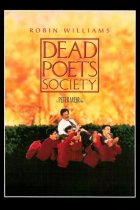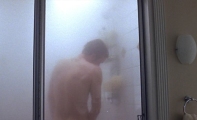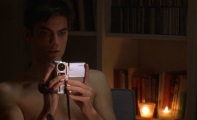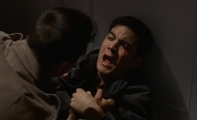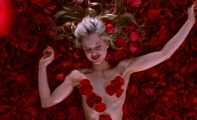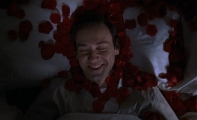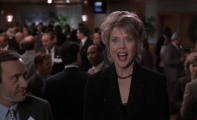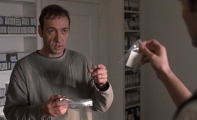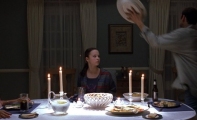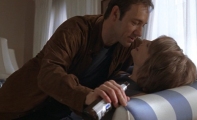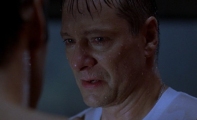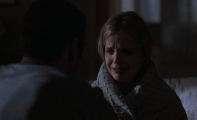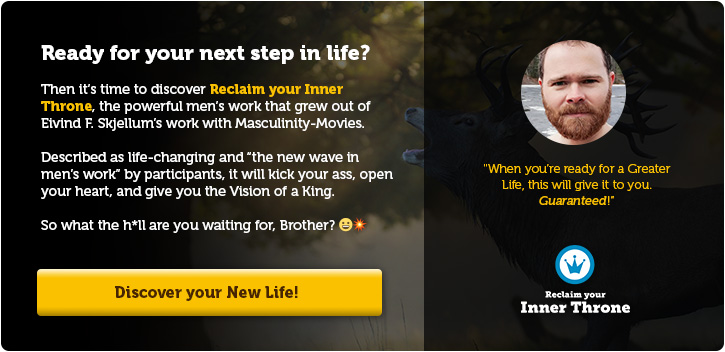American Beauty (1999)
Synopsis
American Beauty introduces us to Lester Burnham, a self-proclaimed sedated man, and his journey towards self-liberation in a world where everything is façade. The movie is a magnificent description of what a journey out of a safe, but ultimately soul-sucking life of pretense might look like and it deserves every award it got.
Lester’s path towards self-liberation teaches us many valuable lessons about the Lover and Wild Man archetypes and reminds us of how, in our efforts to hide our wounds and vulnerable secrets, we lose track of how infinitely blessed we actually are.

| Genre | Drama |
| Production year | 1999 |
| Director | Sam Mendes |
| Male actors | Kevin Spacey, Chris Cooper, Wes Bentley, Peter Gallagher |
Releasing the inner Wild Man in service of love
by Eivind Figenschau Skjellum
American Beauty is an extraordinary movie that impressed me the first time I saw it many years ago. With the discoveries of my later years, it has taken on entirely new meanings and my appreciation for it has deepened even further. The film does many things well, but what it does best is describe the dire consequences the process of male domestication wreaks on our culture.
The trailer describes the premise of the movie this way: «You see a man who is hardly there,» and then continues «Look closer.» The words suggest there is more to this picture; there is more to Lester Burnham– our protagonist and suburban anti-hero par excellence – than meets the eye.
For deep within this man sleeps, as does he in all men, a wild and hairy primal man. He waits there in his cage, a tiny space surrounded by iron bars hardened with political correctness, dreaming of the day when the sedated man who is his vessel will release him – as a true force of vitality, power and love – back into the world.
Through the course of these two hours of movie magic, Lester Burnham takes us on a riveting journey in which he will steal the key to that cage from under his wife’s pillow and set free inside himself the life force that got suppressed when he settled for a life of safety, dishonesty and façade.
But first things first. Let’s get to know Lester’s world:
https://www.youtube.com/watch?v=aq33c6FhRes
The modern, sedated male
The movie, as you can see, starts off with a sad scene: Lester Burnam jerks off in the shower and tells us it will be the high-point of his day. Combined with his general lack of zestfulness, his morning ejaculation turns him, in the scene that follows, into a slouching bag of flesh and bones contemplating his miserable life in the back seat of a car driven to a job he hates by a wife who despises him.
Says Lester’s voiceover in this scene:
Both my wife and daughter think I’m this gigantic loser. And they’re right. I have lost something. I’m not exactly sure what it is, but I know I didn’t always feel this sedated. But you know what – it’s never too late to get it back
The «it» that Lester refers to is the inner Wild Man. The Wild Man archetype that many of us know through Robert Bly’s work is the source of vitality and nature connection in men’s lives. We disconnect from him by disconnecting from our body and our emotions, retreating into our own intellectual hideout, a crystal palace high up in the sky.
So when we feel depressed, lethargic or «empty» – like Lester Burnham – it’s a clue that this primal force inside of us is asleep. We will be disconnected from the big, «dangerous» emotions, such as anger, grief, desire or passion, for they are outside of our control (the Wild cannot be controlled). Again, just like Lester Burnham.
But we men carry so much grief nowadays. It’s like a stockpile of sorrow has accumulated in the male lineage ever since since the coming of the Industrial Revolution. The destruction of male ritual and the shaming of Feminism made matters even worse. As a result, many of us are now surrounded by mountains of pain in a barren emotional wasteland, our lives lived as but a pretense of happiness.
Beyond the façade, deep inside, there is a yearning for meaning; there is a yearning for authenticity – for more than superficial conversation about things we really don’t give a shit about, fake smiles, suppressed anger and the daily wading in oceans of toxic waste spewed on us by a media who has lost its way. We want our lives back!
Beneath the shield of everyday reality and the «yeah, it’s all good»-bullshit that many of us settle for, the yearning runs deep.
So what do we do?
The brave ones among us leave their caves in search for new vistas and Brothers on the path. But the majority sidestep the pain, never leaving the darkness of their own private hole in the ground. And the Wild Man keeps on his hundred-year sleep.
Lester and his ball-busting wife
Lester’s wife Carolyn has, partly because of the absence of his inner Wild Man, become a very emotionally shut down woman. She is heavily invested in «projecting an image of success at all times,» but her real-estate business is not going so well. So she’s faking it, even her marriage.
For her masculine hard-ass career shell (a shell being an inauthentic psycho-emotional defense structure that covers the vulnerable truth underneath) has made her heart inaccessible to Lester. She is now Lester’s very own «ball-buster».
When a woman overdevelops her masculine energy as a protection mechanism, she strengthens her own shadow Warrior and often triggers the shadow Lover in her man, which is happening big time with Lester. That’s why he feels so sedated – it’s a characteristic of the passive pole of the shadow Lover, the impotent Lover. So is his sexual frustration.
Lester and Carolyn are a template of the modern equality ideal: He is emasculated and without direction and she is hardened and career-obsessed. And as most depolarized couples, they make each other want to puke. They both know theirs is a bullshit marriage. All façade and no joy.
Does this sound familiar? If not, read David Deida.
With the Wild Man’s sleep so deep, what could possibly wake him up? For Lester Burnham, it will take a blonde teenager named Angela.
Lester’s angel of mercy makes him hard for life
When Lester meets Angela for the first time, he turns into a mumbling, pubescent fool. His daughter Jane is embarassed, but what she doesn’t know is that Angela is about to revive her father’s zest for life.
For she stands before Lester like a godsent angel of mercy and as he lies in bed that night, bathed in the afterglow of having witnessed perfection in female form, he smiles as rose-petals rain from the ceiling and his voiceover tells us «I feel like I’ve been in a coma for about 20 years and I’m just now waking up».
Lester’s inner sexual circuitry has been rekindled; his coma is over and his hard-on is back. Now all he wants is to fuck Angela. In fact, right now it may be just about the only thing he cares about in life.
But as his obsession over the narcissistic, aspiring model develops, it becomes something more, it becomes a hard-on for life itself. He starts working out again. He breaks free of his soul-stealing job, demonstrating in the process his ability to surprise himself by blackmailing his employer for a full year’s wages. He says FUCK IT to social convention and starts pursuing his dream – and it includes buying himself a red Pontiac Firebird (remember the Red Knight from the myths?).
But most importantly, he starts breaking free from Carolyn’s grip on his balls.
My perhaps most favourite scene in the movie demonstrates so well the sort of socially unacceptable behaviour that may need to take place when a sedated man (akin to David Deida’s 2nd stage of development) reintegrates the primal RED of the first stage. Becoming authentic may require smashing some plates on the way. Let’s have a look at this hilarious spectacle:
https://www.youtube.com/watch?v=lYA4a2l1loM
Look at Lester come back to life! Isn’t it invigorating? Note how Carolyn tells him to speak to their daughter about his day. Note how she does so with the intent of shaming him. And note how he refuses to be shamed and launches into telling Jane about his day with enthusiasm and energy.
A woman can wield enormous power over a man in her ability to shame him and when we break free from that, as Lester does here, life is a different landscape. One in which we know ourselves and our own desire. For freedom – and for women.
What is somewhat unintuitive about this is that while our partner and the world may not like us in our process of breaking free, they will often like us after we have emerged on the other side as self-liberated, self-fulfilled men (if not, it’s definitely time to move on).
Say you have a wife who wants you to change. When you start changing, she may not seem to support you at first, even though it’s what she wanted all along. For very few people like change when it at first starts happening. But once the metamorphosis is complete, she will probably be a very happy woman.
It may not be fair, but it’s reality. And when the man emerges on that other side, he will have taken back his balls, now free to reclaim his desire, both for the woman who previously controlled him and life itself. That is what happens in the following scene where Lester yet again desires his wife:
https://www.youtube.com/watch?v=V9bbYkIM9w0
There is some cause for mourning in this scene, for we see in Carolyn her desire to really surrender to the moment and her subsequent inability to do so due to the possibility of a beer spill on her couch. She cannot embrace that which she truly wants because she is too cut off from herself. And it pains and confuses her.
There’s too much beauty in the world
As the plot develops, we see façades dropping all over the place. Everyone has a secret, whether it’s the homophobic Col Frank Fitt’s desire for Lester, Carolyn’s feelings of being a total failure or Angela’s lack of sexual experience.
This is where the movie really shines, for it is here that we start to see that everyone in this small universe is so into maintaining their façade that none of them are really alive. For in the world of façade, everything is materialism, even the people who you supposedly love.
There is only one person in the whole of this suburban repression-land that sees through the veil – Ricky Fitts, Jane’s boyfriend and son of Col. Fitts. His eyes are blessed with the ability to see the beauty which is hidden to others. And with his video camera, he collects beauty, little gems for future reference. That the only access to true beauty in the movie at first is through Ricky’s movie camera seems to be deeply symbolic.
At any rate, the silent whisper that starts making itself heard in the background of the movie speaks of the inherent beauty of humanity. It speaks of all the crap we do to embellish ourselves to fight our sense of being ugly and how that takes us further away from the beauty of our innermost nature.
The movie points towards a compassionate, soft and loving beauty that vibrates through all of Creation. Ricky is tuned into that beauty, through his mature Lover archetype, as is made so abundantly clear from the famous plastic bag scene.
https://www.youtube.com/watch?v=BZPf-BOnuZ0
And perhaps it is so that the beauty which surrounds us, the love which runs so deep, is just so intense that we can’t deal with it? That if we were to look at it squarely in the eye, we would be rendered undone by the brightness of what we saw?
Perhaps we do self-help courses and all kinds of practices because we don’t dare to look directly, that we want to feel that beauty only in ways which are under our control, so that we won’t be forced to let go and love beyond reason? God help us if we felt it all, right? If we dared to be vulnerable, dared to be ourselves. Wouldn’t that be the end of us, our frail little egos and strategies for life mastery?
Wouldn’t that just be the end of the search altogether? And what, if anything, is a man without a search?
Lester’s final freedom
After having undertaken his Wild Man rebellion, Lester’s heart opens wide. Understand that the Wild Man is a force of violence in no man. It is rather a force of truth. He is not afraid to stand up for love and authenticity if such is necessary, and in his intimate connectedness with nature, he gives his vessel the ability to recognize beauty.
Having broken a plate or two, Lester is now a completely different and a much more authentic man.
His final breakthrough into fully mature manhood comes when he gets his chance to make love to Angela, the moment for which he has yearned. When she lies there naked in front of him, she softens into her vulnerability and admits that she is a virgin who is afraid that she won’t be good enough for him. As seems to be the norm, most of her life has been a façade and Lester is the one to bring her into her own truth.
Let’s have a look at the scene:
https://www.youtube.com/watch?v=fVFmHKDFJtA
For Lester, we intuit that this moment is like his final jolt out of boyhood. His heart is rendered open and his illusions surrounding Angela shatter into a thousand pieces. He no more wants to fuck her, for he is tuning into the feelings of care and compassion for this young and troubled girl that were appropriate all along. The boy that Lester was wanted to take her for his own selfish reasons.
The man that Lester has become is a steward of the Feminine and wishes for her to be happy and healed of her own inner wounds. Selfish sex is never high on a man’s agenda. He has ceased the practice of wanting to masturbate with a female body.
It seems to me that the Wild Man can be said to be, when mapped over to the KWML archetypal system, an amalgamation of primarily Warrior and Lover energy. Lester has now taken the archetypal journey, with the help of Warrior energy, from the impotent Lover through to the addicted Lover and ended up in the fully integrated mature Lover.
He has taken a journey of King energy as well, and this archetype that cares for and wants to bless the people around him, as well as the child inside, has come online. Arriving at maturity, Lester realizes it was never really about Angela. It was about being happy with himself, feeling free to express his own inner power and beauty and being in compassionate, joyful relationship with his own innermost being.
Truly, it never is about the woman; it’s about our own relationship with ourselves. That is the source of true Love, the wellspring from which all gifts in relationship flow. That too is where the divine spark – the true Beauty – in us resides. And that realization leads us to the words that have been uttered by many a wise one in the past – a relationship is not a good place to get something, but an amazing place to co-create something.
When Angela asks Lester how he is, he replies, to his own wonderment «I am great.» The innocence and surprise in his face is, as you can see, profound and priceless. Lester, in his recognition of being fundamentally okay, even happy, with himself, finally experiences in himself authentic love and freedom. The façade is gone, the American Beauty real at last.
Conclusion
I read somewhere, it must have been the words of Bly or Moore, about how weakened the Lover archetype has become in our society. We are afraid of real beauty or we have just lost our ability to perceive it. Paintings by the masters are sold for millions, but the people who buy them cannot appreciate them – they merely buy them for status and the good investment.
People go in hordes to plastic surgeons, though recognition of their inner beauty eludes them even when the scalpel has done its job and they’re sown back together. Nature meets us with its magnificence, but we cannot see it, for we visualize in it rural development or feeding grounds for cattle. Beauty is lost on us and all that is left is façade.
When roses are tended, as in early parts of this movie, to make the gardener look good to her neighbor, they lose their beauty.
For men, the Lover archetype, the deep psychic energy that allows us our recognition of beauty, is particularly challenging, for it can trigger fears of being feminine. Recognizing beauty can in many men even trigger fears that they’re turning gay.
Much macho posturing is sourced in this fear. Instead, these men become trapped in shadow expressions of Lover energy, addicted or impotent.
American Beauty, through the example of Ricky’s eyes and Lester’s journey, is a clarion call to re-embrace authentic beauty in our lives – to dare to see and express the beauty which is already inherent.
And it indicates to us that to do that without feeling he is losing his balls, a man must be able to access authentic Wild Man energy. It appears that a man can only recognize beauty truthfully if he is also able to be angry, to grieve, to say “fuck you”.
When all is said and done, the real challenge is to be authentic. Authenticity holds within it all of the archetypes. And whether it’s your fear of expressing appreciation of beauty or to speak your truth to the woman you’ve chosen, you know very well all the ways in which you’re bullshitting yourself.
Powerful ideas from American Beauty
- Starting off your day with an ejaculation is a terrible idea. It drains you of energy.
- Most people are not what they first seem. Look closer.
- There is nothing beautiful or right about being the man others want you to be. Beauty is in being the man you are meant to be. You are already surrounded by the miracle of life. If you are not aware of that, it's because you are emotionally repressed.
- You must dare to be uncivilized, angry, politically incorrect if the truth calls for it. If you don't have that ability, you will not really live and your balls will be crushed in every encounter you have with other human beings.
- The Feminine has the capacity to reignite the Masculine. If you feel "dried up", chances are there is too little feminine energy in your life.
- When an older man desires sex with considerably younger women, it would do him good to check his relationship to his mother and/or his wife/partner. Chances are they are too powerful for him and that he desires younger women simply because they are a less challenging source of feminine energy. A man's desire for young ass could then be his impotence expressing itself (though there is nothing wrong with that if that is what is needed for him to wake up).
- Most women don't really like to be the breadwinner of the household (deep down beyond contemporary social conditioning). They want to feel cared for and protected by their man.
- Men's unhappiness often comes from our unwillingness to self-recognize ourselves as inherently beautiful, lovable, powerful. We would rather worship the chase at the altar of make-believe.


